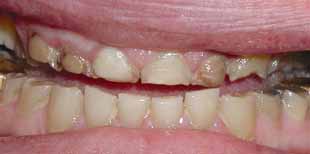The Tooth Whisperers
Source: Temple University
Released: Tue 11-Nov-2008, 13:50 ET

| |
This patient of Bassiouny's had damage similar to a bulimic's teeth, but it was actually caused by dysmenorrea, a gynecological disorder. Bassiouny has been studying how teeth can tell dentists about a patient's health for more than 30 years. |
Newswise — The phrase, “the eyes are the windows to the soul,” is attributed to several authors and philosophers. But the phrase, “your teeth are the windows to your health,” can be attributed to Mohamed Bassiouny, DMD, MSc, PhD, who has been studying how teeth provide important clues to his patients’ overall health for more than 30 years.
As part of his ongoing research, Bassiouny chronicles the case of a patient in the November/December issue of General Dentistry whose teeth had eroded from stomach acids, a condition normally associated with bulimia and other systemic disorders.
However, in this case the patient had no history of an abnormal eating disorder or gastric reflux syndrome. Rather, she suffered from dysmenorrhea - painful cramping related to menstruation. This severe cramping is what forced acids from her stomach back up her esophagus and into her mouth.
Bassiouny, a professor of restorative dentistry at Temple’s Kornberg School of Dentistry, says he was able to identify and diagnose the problem by accounting for her oral health status, considering her entire medical and dental history, and factoring in other aspects that might not seem related.
“It’s important for oral health care providers to consider all options,” he said. “I don’t think it’s enough just to look in a person’s mouth, see a cavity and fill it. Other systemic health factors should also be considered – things like a patient’s heredity and race, as well as their habits and lifestyle – so that we can treat the condition and also avoid recurrence.”
It’s this broad way of thinking that has allowed Bassiouny to find other information about a patient’s health just by looking into his or her mouth. Among other things, damage to a patient’s teeth can tell a dentist about what their diet is like, if they use drugs (and what kind), if they have a mental disorder, or if they’re under stress.
Bassiouny says in this respect, dentists are on the front line when it comes to treating patients’ overall well being.
“Many patients can have damage to their teeth as a result of another disorder or because of a lifestyle or habit. But many have lived with it for so long that they may not recognize that there’s a problem,” he said.
“They may think its normal, so they don’t even mention it to the doctor when they go for a check-up,” he added. “But if we see something in the mouth that raises a red flag, not only can we treat their oral health, we can also direct them to get the proper care they need if something serious is happening elsewhere in the body.”
|



